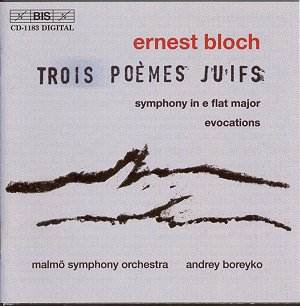Three Bloch works from the beginning (1913), middle
(1937) and end (1955) of Bloch's life.
'Steady as she goes' might be the watchword of Bis
in planning and implementing their composer series - no hectic rush
of releases - just a steady trickle: one every four or five years. This
Bloch disc, the third from the von Bahr stable, uses the same band as
the other two ringing the changes with the conductor.
Bloch, Genevan born, studied variously with Thuille,
Ysaye and Knorr. His early works (including those on a Timpani
CD I reviewed a couple of years ago) have greater communicative
immediacy than his later ones. The Symphony, his last major orchestral
work, is far too objective to be memorable. It redeems itself with an
allegro deciso finale that reaches out in nobility: this is Bloch
the philosopher and humanist (words taken from his memorial plaque).
Even so this is not a work that I want to return to at all frequently.
Contrast this with the symphonic suite Evocations. Here, Bloch,
with creativity blessed and goaded by Chinese art, writes music bronzed
by, and radiating, glowing light. The phantasmal lacy tapestry of this
music places it alongside that of Ravel and Vaughan Williams (try the
latter's Flos Campi) and, in its more luxurious moments, Charles
Griffes. Evocations was a popular title used by Carl Ruggles
and Charles Martin Loeffler, among others. The Trois poèmes
juifs are Bloch back on semitic song. It was written for the Bostonians
in 1913. This is a work of symphonic length if not cohesion. Its three
movements (Danse, Rite, Cortège Funèbre)
are along the same axis as the more monochromatic aspects of Respighi's
Vetrate di Chiesa and the humanist spirituality of Vaughan Williams'
symphonies 3 and 5. The missing element is the raging and deckle-edged
violence of the Violin Concerto and of Schelomo. You do not need
Bloch's programme notes for the Poèmes. Come to this music
without suggested mindsets. I am sure that you will appreciate it better
without such 'props'.
The other two Bloch orchestral items in the BIS/Malmö
uniform series are: Symphony in C sharp minor and Schelomo (BIS-CD-576
conducted by Lev Markiz) and Violin Concerto, Poems of the Sea,
Suite Symphonique (BIS-CD-639 conducted Sakari Oramo).
Good notes by Per F. Broman supporting one rather thin-lipped
example of 1950s objectivity (the symphony) and two where the composer's
well-stocked imagination reaches out with eloquence.
Rob Barnett


